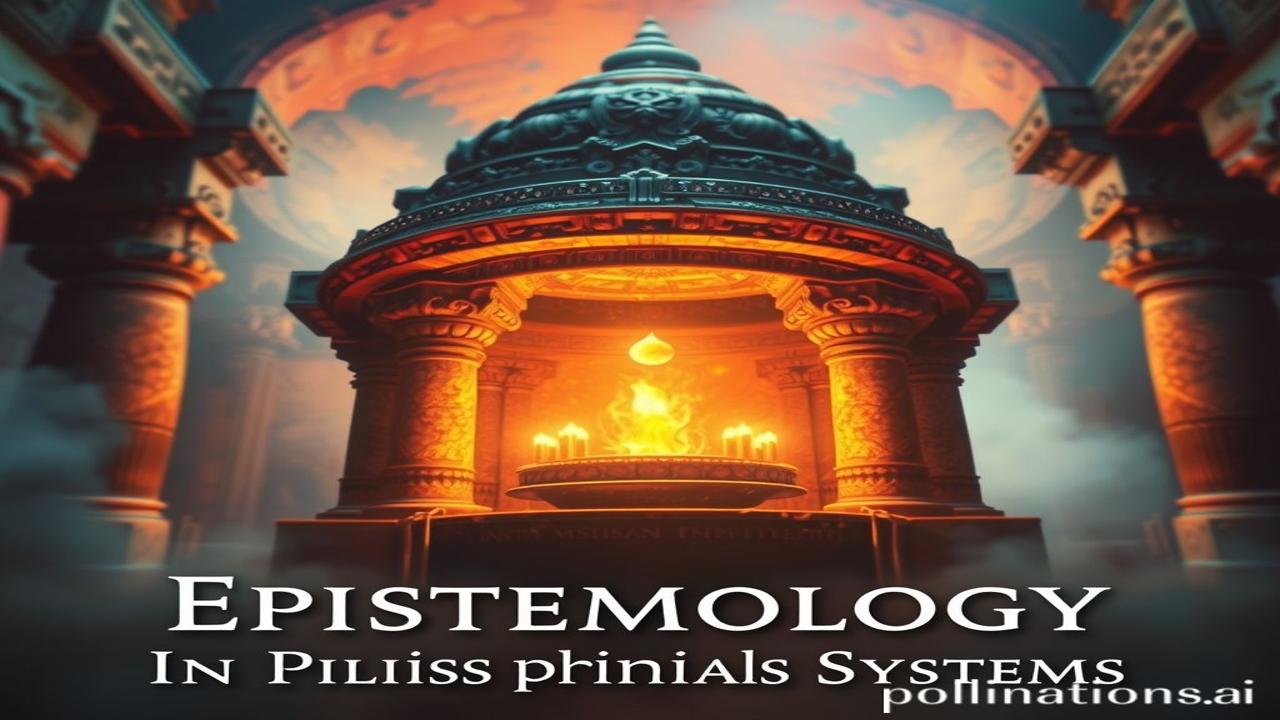Waqt Ke Panne: Decoding the Wisdom of Ancient India – Epistemology in Indian Philosophical Systems
Kabhi socha hai, doston, ki hamaare purvaj kaise sochte the? Kaise unhone duniya ko dekha, samjha aur Gyan prapt kiya? Imagine, 5000 saal pehle, jab smartphones nahi the, internet nahi tha, toh woh sachchai kaise dhoondhte the? Let’s embark on a journey to uncover the fascinating world of epistemology in Indian philosophical systems. Waqt ki dhool mein chhupi hui kuch aisi kahaniyan hain, jo aaj bhi humein roshni dikhati hain.
Epistemology: What is it, Yaar?
Okay, toh ‘epistemology’ ek bada word hai, right? But don’t worry, hum ise aasaan banayenge. Simply put, epistemology is the theory of knowledge. Yeh humse poochta hai: Hum kaise jaante hain ki hum jo jaante hain woh sahi hai? What are the sources of knowledge? How reliable are they? How can we justify our beliefs? Indian darshan (philosophy) mein, isko Pramana Shastra kehte hain.
The Roots: When and Where?
The quest for knowledge in India goes back millennia. The Vedas, Upanishads, and the various philosophical schools like Nyaya, Vaisheshika, Samkhya, Yoga, Mimamsa, and Vedanta, all grappled with these questions. These systems developed over centuries, starting from around 1500 BCE with the Vedas and continuing to evolve till the medieval period. Think of it – while the West was just getting its philosophical bearings, India had already built sprawling intellectual cities of thought!
Why is it Important, Bro?
Understanding epistemology is crucial because it shapes how we perceive the world, make decisions, and live our lives. It’s about critical thinking, questioning assumptions, and seeking truth. Aaj ke zamane mein, jab fake news aur misinformation har taraf hai, epistemology ka knowledge aur bhi zaroori ho gaya hai!
Zameeni Sach: People and Life – A Glimpse into the Past
Imagine a scene:
“Pandit ji, yeh Gyan kaise milega?” a young disciple asks his Guru, sitting under a sprawling banyan tree. The air is thick with the scent of jasmine and sandalwood.
“Beta,” the Guru replies, his voice calm and steady, “Gyan ke anek dwar hain. Pramanas are the keys to unlocking them.”
He then goes on to explain the various pramanas – pratyaksha (perception), anumana (inference), upamana (comparison), and shabda (testimony). He tells stories of ancient rishis, their rigorous methods of inquiry, and the debates that shaped their understanding of the world.
Rulers like Ashoka, known for his devotion to dharma, supported the development of these philosophical schools. Artisans and craftsmen, through their meticulous work, understood the practical application of knowledge. Even farmers, observing the cycles of nature, developed their own understanding of cause and effect.
Dharohar Aur Pehchan: Cultural Significance Today
The principles of epistemology continue to resonate in modern India. We see its echoes in:
- Education: Emphasis on critical thinking and analysis.
- Law and Justice: Reliance on evidence and testimony.
- Art and Literature: Exploration of different perspectives and truths.
- Everyday Life: Our inherent curiosity and desire to understand the world around us.
Bharatiyata is deeply intertwined with the pursuit of knowledge and the acceptance of diverse viewpoints. The phrase “Satyam Shivam Sundaram” encapsulates the Indian ideal of truth, goodness, and beauty as interconnected aspects of reality.
Mazedar Tathya Ya Bhram-Bhanjak: Fun Fact!
Log samajhte hain ki Indian philosophy mein sab kuch spirituality aur meditation ke baare mein hai, lekin asli sach yeh hai that it also involves rigorous logic, analysis, and debate. The Nyaya school, for example, is all about logic and argumentation!
Drishya Aur Bhavnayen: Visual & Sensory Layer
Close your eyes. Imagine the sounds of Sanskrit chants echoing through ancient halls. Feel the cool stone of the temple walls beneath your fingertips. Smell the fragrant smoke rising from the incense sticks. The air is filled with the buzz of intellectual discussions and the quiet hum of meditation. This is the atmosphere where these profound ideas were born and nurtured.
Antim Vichar Ya Uddharan: Closing Insight
As we journey through the labyrinth of Indian epistemology, we realize that the pursuit of knowledge is not just about accumulating facts, but about cultivating wisdom, fostering compassion, and striving for a deeper understanding of ourselves and the universe.
“Aano bhadraah kratavo yantu vishwatah” (Let noble thoughts come to us from all directions) – Rigveda
